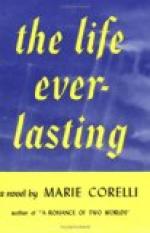“Poor Catherine!” I said—“Then indeed it is no use telling you anything! You are in darkness instead of daylight, and no one can make you see. Oh, what can I do to help you?”
“Nothing,”—she answered—“My faith—it was never very much,—was taken from me altogether when I was quite young. Father made it seem absurd. He’s a clever man, you know—and in a few words he makes out religion to be utter nonsense.”
“I understand!”
And indeed I did entirely understand. Her father was one of a rapidly increasing class of men who are a danger to the community,— a cold, cynical shatterer of every noble ideal,—a sneerer at patriotism and honour,—a deliberate iconoclast of the most callous and remorseless type. That he had good points in his character was not to be denied,—a murderer may have these. But to be in his company for very long was to feel that there is no good in anything--that life is a mistake of Nature, and death a fortunate ending of the blunder—that God is a delusion and the ‘Soul’ a mere expression signifying certain intelligent movements of the brain only.
I stood silently thinking these things, while she watched me rather wistfully. Presently she said:
“Are you going on deck now?”
“Yes.”
“I’ll join you all at luncheon. Don’t lose that bit of heather in your dress,—it’s really quite brilliant—like a jewel.”
I hesitated a moment.
“You’re not vexed with me for speaking as I have done?” I asked her.
“Vexed? No, indeed! I love to hear you and see you defending your own fairy ground! For it is like a fairy tale, you know—all that you believe!”
“It has practical results, anyway!”—I answered—“You must admit that.”
“Yes—I know,—and it’s just what I can’t understand. We’ll have another talk about it some day. Would you tell Dr. Brayle that I shall be ready for him in ten minutes?”
I assented, and left her. I made for the deck directly, the air meeting me with a rush of salty softness as I ran up the saloon stairway. What a glorious day it was! Sky, sea and mountains were bathed in brilliant sunshine; the ‘Diana’ was cutting her path swiftly through waters which marked her course on either side by a streak of white foam. I mentally contrasted the loveliness of the scene around me with the stuffy cabin I had just left, and seeing Dr. Brayle smoking comfortably in a long reclining chair and reading a paper I went up to him and touched him on the shoulder.
“Your patient wants you in ten minutes,”—I said.
He rose to his feet at once, courteously offering me a chair, which I declined, and drew his cigar from his mouth.
“I have two patients on board,”—he answered, smiling—“Which one?”
“The one who is your patient from choice, not necessity,”—I replied, coolly.
“My dear lady!” His eyes blinked at me with a furtive astonishment— “If you were not so charming I should say you were—well!—Shall I say it?—a trifle opinionated!”




